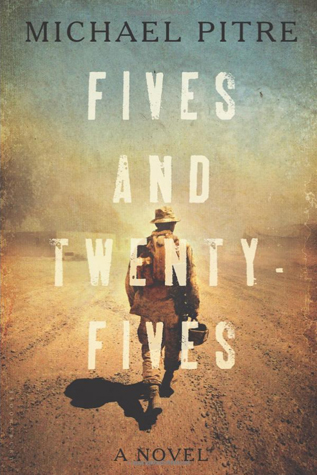
by by Margaret Kolb

Published by Bloomsbury, 2014 | 400 pages
Tim O’Brien changed war literature forever with his treatment of the Vietnam War, in particular with his short story collection The Things They Carried. Blending fiction and reality in a style he likened to “verisimilitude,” he revealed war as an indeterminate process, never ending, never chronological, and never monophonic. We can only endeavor to understand war and its effect on participants, he suggested, when we relinquish hope of any resolution, at least any satisfying or comforting resolution. Michael Pitre’s recently published novel Fives and Twenty-Fives is a groundbreaking extension of O’Brien’s style to the contemporary challenges our veterans face.
Fives and Twenty-Fives follows a Marine road repair platoon through an Iraq deployment and the turbulent months of readjustment after returning home. The combat action occurs in Anbar province, the Sunni dominated province that contains Ramadi and Fallujah, and that for several years was extremely dangerous, even by Iraq and Afghanistan standards. The platoon’s primary mission is to repair potholes. Not, it is worth noting, for infrastructure purposes. The reason is far more urgent: improvised explosive devices (IEDs) placed there by insurgents target both American patrols and civilian travelers. Pitre meticulously describes the process of dismantling these bombs and completing their repair mission. The platoon first secures the area by sending foot patrols to occupy positions surrounding the pothole, moves their vehicles outside of the potential blast radius, sends a single scout Marine to crawl to the hole and check for explosives, and then prepares a robot to carry an explosive charge to the hole and detonate the IED. The insurgents, of course, frequently observe this routine, and use the opportunity to attack the static and therefore vulnerable force with rifles and rocket propelled grenades.
The term “Fives and Twenty-Fives” refers to a specific event in this highly routinized sequence. Once the patrol arrives about 300 meters from the pothole, each vehicle would halt and conduct a visual security sweep called “Fives and Twenty-Fives” for secondary IEDs placed strategically to strike the explosive ordnance disposal team. The occupants would search the area 5 meters around the vehicle for IEDs against the vehicle (an IED detonated at that distance could tear through the vehicle killing everyone inside), and then continue the visual scan out to 25 meters to ensure there were no IEDs behind or in front of the vehicle (IEDs detonated at this distance would kill or injure anyone who has left the armored vehicle). The name and process establishes a routine for the Marines to train, enabling them to execute in high stress situations.
Amongst veterans of Iraq and Afghanistan, the term “Fives and Twenty-fives” is ubiquitous. Pitre, however, employs it as a metonym for what the security routine represented to the Marines. War is a unique experience for each affected individual; although it is the worst experience of a veteran’s life, characterized by hunger, sleep and sensory deprivation, and constant mortal fear, it becomes a vital part of the veteran’s identity. The security routine embodied in this term “Fives and Twenty-fives” represents this paradox. It is undoubtedly the most terrifying moment in any combat patrol – the moment where the bomb is most likely to explode, and the enemy is most likely to open fire – but after a while the routine becomes comforting. Every step is designed to protect the Marines from the enemy, and over time, the Marines begin to associate these steps with feelings of safety and security. When they return home, even though the threat that necessitated the routine is gone, they feel unsafe and insecure in the routine’s absence.
Fives and Twenty-Fives alternates narrators, between Doc Lester, the corpsman (medic), Lieutenant Donovan, the platoon commander, and “Dodge”, whose real name is Kateb, the interpreter. Through these characters we also meet Sergeants Gomez and Zahn, two of the central authorities in the platoon. Overall, the Marine characters are fairly typical of war literature. During the combat vignettes, Lieutenant Donovan struggles to balance his concern for the safety of his platoon with the aggressive demands of his higher command; Doc Lester becomes depressed and distant; and the two Sergeants struggle to retain a sense of humanity while maintaining their strength in front of the Marines to preserve morale. The stories upon return home are similarly typical of post deployment stress: drug and alcohol addiction, difficulty connecting socially and romantically, and constant regret.
The most interesting narrative thread is that of Dodge, the interpreter. He perfectly represents his victimized generation of Iraqis; born a Sunni child of one of Saddam’s officials, he is caught between brutal Shia militias who murder any Sunni they encounter out of wonton retribution, Sunni militias who are at war with the American forces, and the Americans themselves who default to aggression at every encounter. Dodge alternates between several pseudonyms, and has two identification cards: one with a Shia name, and one with a Sunni name. He and his two friends try to escape Iraq, but they are caught between the Shia militias and Dodge’s own Sunni family, and eventually Dodge betrays his friends and family to join the Americans. At the novel’s conclusion, he is in Tunisia participating in the Spring revolution. Here Pitre is making an unsubtle connection to the George W. Bush administration’s idea that regime change in Iraq would spark regime change across the Middle East. More poignantly, Dodge’s narrative represents how our aggression prompted similarly conflicted responses in the civilian victims. Even as we suffer to read about Dodge’s plight in Tunisia and the loss of his family and friends, he is pursuing a dream that never would have been possible under Saddam. Pitre’s treatment of this interpreter, caught between horrifically violent forces, evokes a powerfully simple truth, articulated by the French – Iranian author Marjane Satrapi: “democracy is not a present you can deliver with bombs.”
Two minor criticisms come to mind. The climactic combat action that Pitre builds his narrative arc towards is uncomfortably similar to the famous heroic defense of a downed helicopter by Gary Gordon and Randy Shughart in the 1993 Battle of Mogadishu, depicted later in the book Blackhawk Down. Of course multiple helicopters have been shot down - and heroically defended - in Iraq and Afghanistan, but Pitre’s telling is distractingly reminiscent of Bowden’s previous non-fiction account of the Mogadishu incident. Also, the portrayal of female characters throughout the text is a bit flat. They evoke too much of the cliché ideal Marine’s woman – infinitely patient, perceptive, loyal, and giving, falling for the troubled veteran – and fail to meaningfully engage the darkness that engulfed so many relationships.
Michael Pitre deserves praise for Fives and Twenty-Fives, in particular for his courage in representing the war through fiction in such an honest, aesthetic, and vibrant manner. Too many veteran authors resort to memoirs and short stories, uncomfortable with the burden of the extended fictional account. Pitre has given a new voice to this war weary generation, particularly those in Iraq and the broader Middle East who continue to suffer, wondering if this is the democracy they were promised. Kateb (Dodge) sums it up nicely. “Always, I am speaking English on behalf of fools.”
Adam Karr graduated from the United States Military Academy at West Point in 2005 with a B.S. in International History, and this year earned a Masters in English from the University of Virginia. Adam also served a 14 month tour in Baghdad, Iraq and a 13 month tour in Nangahar Province, Afghanistan. He currently instructs English at West Point.















click to see who
MAKE Magazine Publisher MAKE Literary Productions Managing Editor Chamandeep Bains Assistant Managing Editor and Web Editor Kenneth Guay Fiction Editor Kamilah Foreman Nonfiction Editor Jessica Anne Poetry Editor Joel Craig Intercambio Poetry Editor Daniel Borzutzky Intercambio Prose Editor Brenda Lozano Latin American Art Portfolio Editor Alejandro Almanza Pereda Reviews Editor Mark Molloy Portfolio Art Editor Sarah Kramer Creative Director Joshua Hauth, Hauthwares Webmaster Johnathan Crawford Proofreader/Copy Editor Sarah Kramer Associate Fiction Editors LC Fiore, Jim Kourlas, Kerstin Schaars Contributing Editors Kyle Beachy, Steffi Drewes, Katie Geha, Kathleen Rooney Social Media Coordinator Jennifer De Poorter
MAKE Literary Productions, NFP Co-directors, Sarah Dodson and Joel Craig